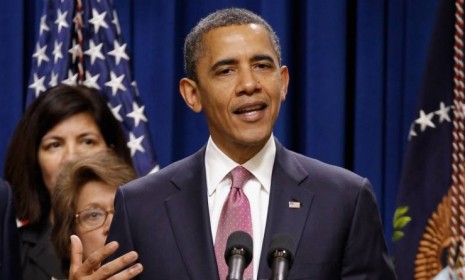Is the Buffett Rule fair?
The proposal to impose a minimum 30-percent tax rate on the super-rich stalls in the Senate, with some arguing that passing the bill would only make matters worse

A free daily email with the biggest news stories of the day – and the best features from TheWeek.com
You are now subscribed
Your newsletter sign-up was successful
Republicans on Monday blocked the Buffett Rule bill, a Democratic measure to impose a minimum tax rate of 30 percent on Americans making over $1 million a year. President Obama, who has pushed the "Fair Share" legislation on the campaign trail, said the GOP had acted "once again to protect tax breaks for the wealthiest few Americans at the expense of the middle class." Republicans dismissed the proposal as an election-year gimmick that would unfairly penalize investors and kill jobs in the process. In the fight to make the tax code more fair, is the Buffett Rule the best idea?
The Buffett Rule is about politics, not fairness: "Despite heated rhetoric demanding they 'pay their fair share,'" says Andrew Moylan at U.S. News & World Report, "the truth is that 'the rich' already shoulder the largest share of financing government." One-percenters make 19 percent of U.S. income, but pay 39 percent of federal income taxes. Obama is just trying to throw red meat to voters by threatening the rich with unfair and "staggeringly high penalties" on investment income.
The Week
Escape your echo chamber. Get the facts behind the news, plus analysis from multiple perspectives.

Sign up for The Week's Free Newsletters
From our morning news briefing to a weekly Good News Newsletter, get the best of The Week delivered directly to your inbox.
From our morning news briefing to a weekly Good News Newsletter, get the best of The Week delivered directly to your inbox.
This would improve a tax code that favors the rich: "Face it, America. We've got an overly complex, unfair, inefficient" tax code, says Jared Bernstein at Rolling Stone. "It's riddled with loopholes" that let the 400 richest Americans, with average incomes over $100 million, pay just 18 percent in federal income tax. The Buffett Rule would simply make all top earners pay at least 30 percent, like many in the middle class. "Boom"... instant fairness.
"Why we need a Buffett Rule (for now)"
Good idea, bad execution: This bill is "good politics," says Leonard E. Burman in The New York Times, as most Americans think it's wrong that a billionaire investor like Warren Buffett can pay a lower rate than his secretary due to lighter taxes on investment income. But the proposal is "bad policy," as it would add new inequities to an already unfair system — for example, two people making $999,000 each would get hit with a huge tax penalty if they married each other. We need simplicity, not more complexity."
"The Buffett Rule: Right goal, wrong tool"
A free daily email with the biggest news stories of the day – and the best features from TheWeek.com
-
 Political cartoons for February 16
Political cartoons for February 16Cartoons Monday’s political cartoons include President's Day, a valentine from the Epstein files, and more
-
 Regent Hong Kong: a tranquil haven with a prime waterfront spot
Regent Hong Kong: a tranquil haven with a prime waterfront spotThe Week Recommends The trendy hotel recently underwent an extensive two-year revamp
-
 The problem with diagnosing profound autism
The problem with diagnosing profound autismThe Explainer Experts are reconsidering the idea of autism as a spectrum, which could impact diagnoses and policy making for the condition